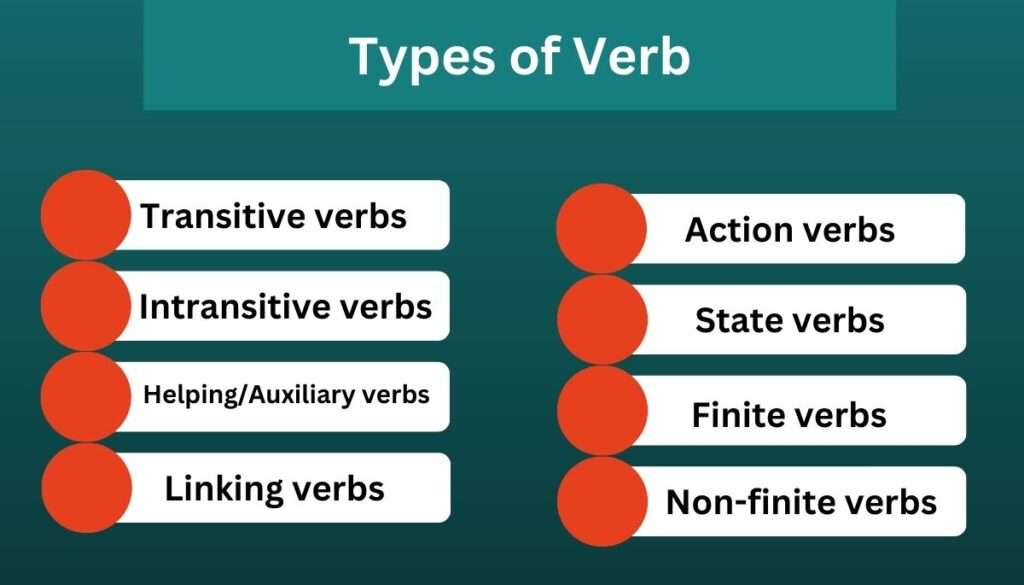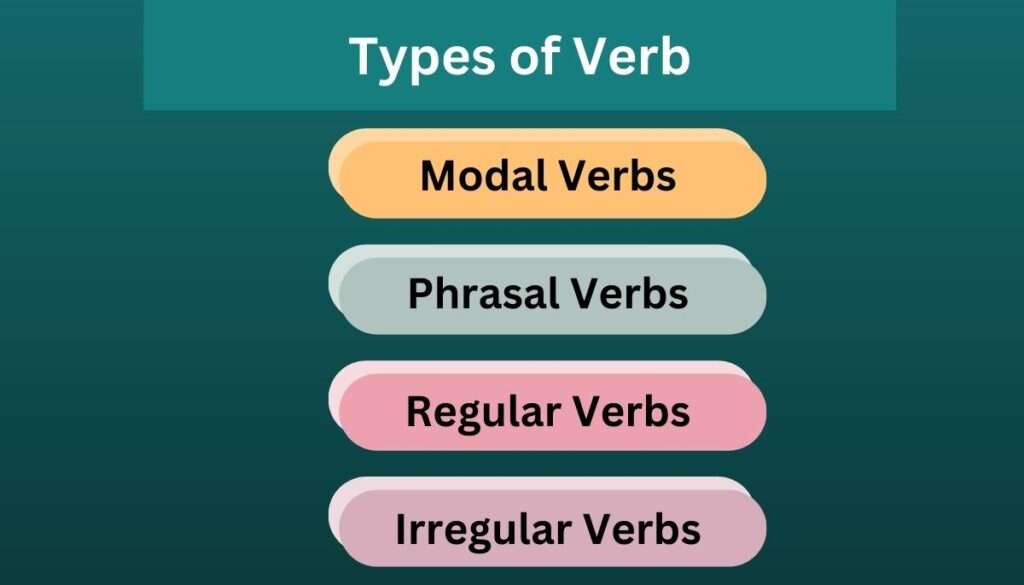This blog post explains the types of verb in English grammar with definitions and examples. The verb is a component of parts of speech, defined as a word that denotes an action or a state. Different grammars have differing opinions about the kinds of verbs and have presented various classifications of verbs in English grammar.

Verbs have many types:
- Transitive Verbs
- Intransitive Verbs
- Helping/Auxiliary Verbs
- Linking Verbs
- Regular Verbs
- Irregular Verbs
- Finite Verbs
- Non-finite Verbs
- Modal Verbs
- Phrasal Verbs
- Action Verbs
- Stative Verbs
Definitions of Different Verb Types
| Verb Type | Definition |
| Transitive Verbs | A verb that needs an object to complete its meaning. |
| Intransitive Verbs | A verb that does not need an object to complete its meaning. |
| Helping/Auxiliary Verbs | It works with other verbs to change the meaning of a sentence. |
| Linking Verbs | Linking verb is used to link a subject with a subject complement. |
| Regular Verbs | A verb whose past and past participle forms are formed by adding ‘d’ and ‘ed’. |
| Irregular Verbs | A verb whose past and past participle forms are not formed by adding ‘d’ and ‘ed’. |
| Verb Type | Definition |
| Finite Verbs | A finite verb shows agreement with the subject and is marked for tense. |
| Non-finite Verbs | A non-finite verb does not show an agreement with the subject and is not marked for tense. |
| Modal Verbs | A verb that expresses concepts such as ability, necessity, possibility, or permission. |
| Phrasal Verbs | Phrasal verbs are combinations of a verb with prepositions and/or adverbs that have a different meaning from the individual words used to form them. |
| Action Verbs | A verb that refers to physical actions. |
| Stative Verbs | A verb that refers to conditions or states of being. |
Examples of Different Verb Types

| Verb Type | Examples |
| Transitive Verbs | The wealthy man bought three paintings. She really hates broccoli. |
| Intransitive Verbs | Airplanes fly. The children slept while the adults worked. |
| Helping/Auxiliary Verbs | He can be busy. We have beautiful flowers. |
| Linking Verbs | He is a doctor. I am busy. |
| Regular Verbs | I walked ten miles. She watered plants. |
| Irregular Verbs | I ate food. They read the book. |
| Verb Type | Examples |
| Finite Verbs | She was waiting in the room before he came in. Does your brother know my brother? |
| Infinite Verbs | She tiptoed round the house so as not to wake anyone. You need to paint the whole cupboard, starting from the bottom. |
| Modal Verbs | You can go. I may eat the cake. |
| Phrasal Verbs | The frustrated business owner closed down his store. Dave loves to show off his baseball trophies. |
| Action Verbs | I caught the ball. She crossed the road. |
| Stative Verbs | I feel pain. She sees the misery. |
Frequently Asked Questions Part 1
Q1: What is an action verb?
Ans: Action verb is a type of verb that denotes an action or physical movement.
Q2: What is a helping verb?
Ans: A helping verb works with other verbs to change the meaning of a sentence.
Q3: What are the forms of to be verbs?
Ans: The 8 forms of to be verbs are is, are, am, was, were, be, been, and being.
Q4: Is ‘is’ a verb?
Ans: Yes, ‘is’ is a form of to be verb.
Q5: What are reflexive verbs?
Ans: A reflexive verb is a type of transitive verb where the subject and object always refer to the same person or thing. In other words, the object of a reflexive verb is always a reflexive pronoun. Thus, an example of this concept is the phrase ‘to enjoy oneself,’ as shown in the question ‘Did you enjoy yourself?’
Q6: What are strong verbs?
Ans: Strong verbs are not basic forms, they are specific, give more accurate meaning attaching emotional touch to the word’s meaning. When we say a man ‘ran’, it does not infer much meaning, but saying a man ‘dashed’, suggests that an emotive behaviour is involved. So, perhaps he is running in fear of a monster, or possibly he is simply late for work.
Frequently Asked Questions Part 2
Q7: What is an active verb?
Ans: When the subject of the sentence performs the action, the verb is called an action verb. In the example ‘Ahmed plays football’, plays is an active verb as the subject Ahmed performs this action.
Q8: What are stative verbs?
Ans: Stative verbs are those that denote the state of being, they are not physical actions rather though processes, senses, opinions, possessions, feelings, emotions, and perceptions. Examples include have, own, see, think, love, taste, belong, appear, doubt etc.
Q9: What are some ar verbs?
Ans: Some ar verbs are: arouse, arrange, arrest, arise, arose, argue, arrive, armour, archive etc.
Q10: What is a list of verbs?
Ans: The list of verbs is as follows:
|
abhorrent |
|
abject |
|
abominable |
|
abrasive |
|
abusive |
|
abysmal |
|
acerbic |
|
acrimonious |
|
adversarial |
|
afraid |
|
aggressive |
|
agonizing |
|
ailing |
|
alienated |
|
aloof |
|
amoral |
|
annoying |
|
antagonistic |
|
apocalyptic |
|
argumentative |
|
arrogant |
|
asinine |
|
avaricious |
|
awkward |
Q11: What are some verbs end in ing?
Ans: Some verbs end with ing are arriving, preparing, calling, crossing, dealing, availing, stealing, planning, tearing, getting, migrating, writing etc.
Q12: What is a list of action verbs?
Ans: A list of action verbs is as follows:
- Administered
- Arranged
- Chaired
- Coordinated
- Directed
- Executed
- Delegated
- Headed
- Managed
- Operated
- Orchestrated
- Organized
- Oversaw
- Planned
- Produced
- Programmed
- Spearheaded
Q13: What is past tense of fly verb?
Ans: Past tense of verb fly is ‘flew’.
Final Words
In this article, I have discussed definitions and examples of different types of verbs. Therefore, different grammars have discussed various types of verbs and I have given you the details of some of these types. For video lectures, watch these videos:
